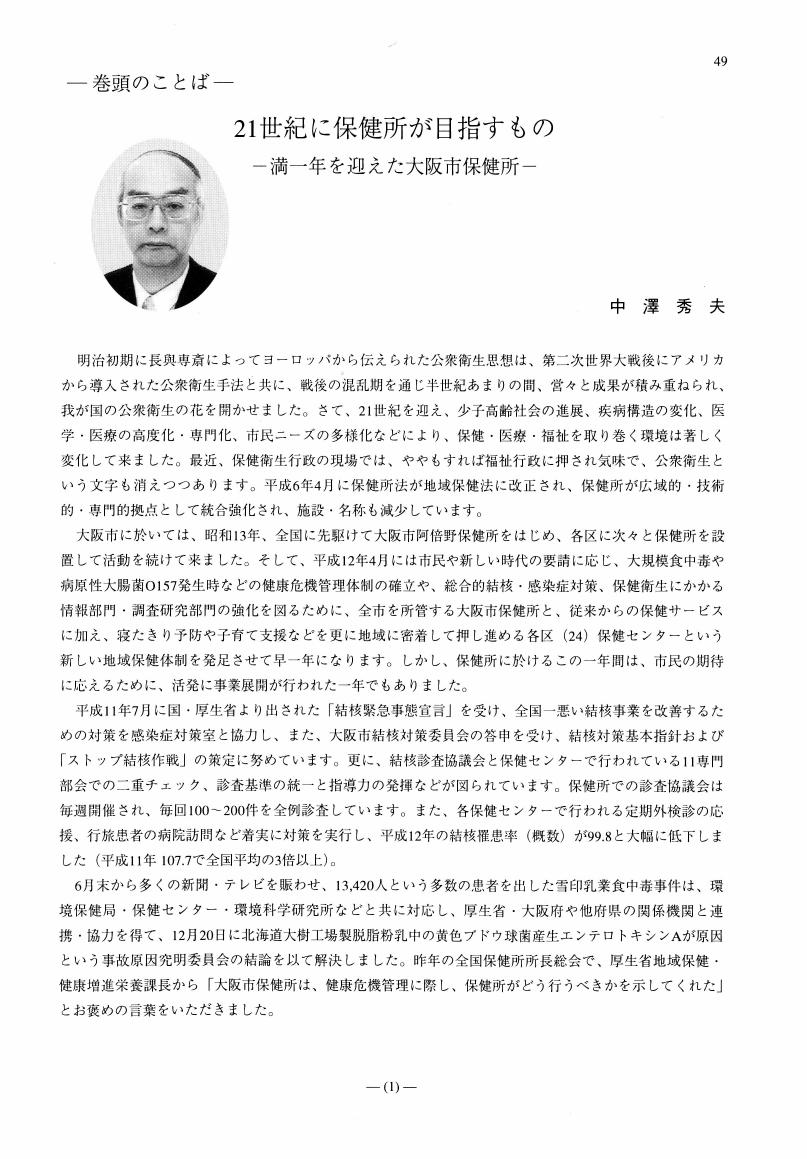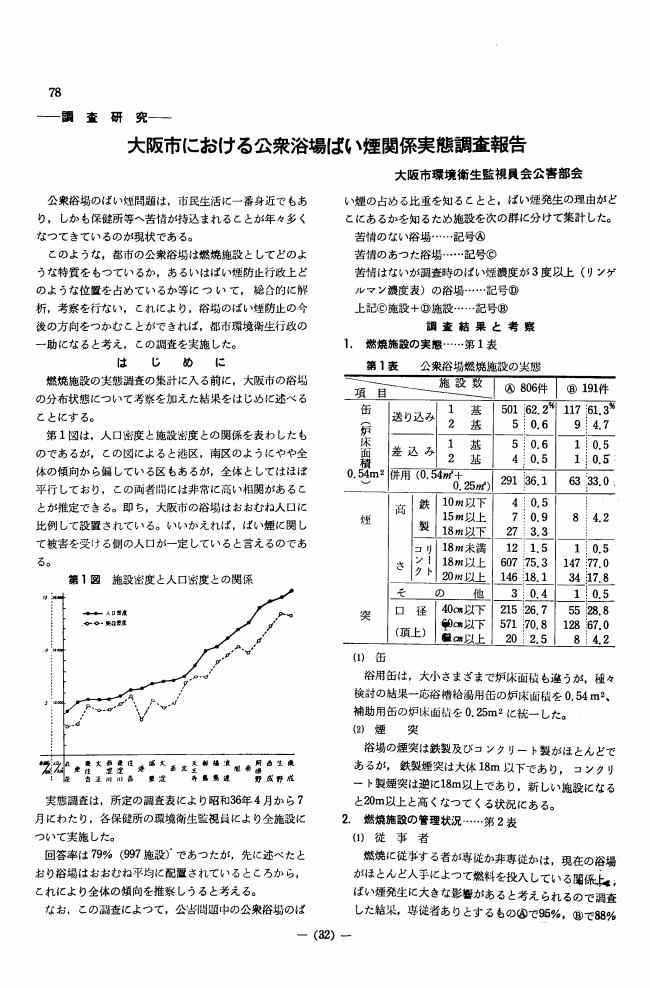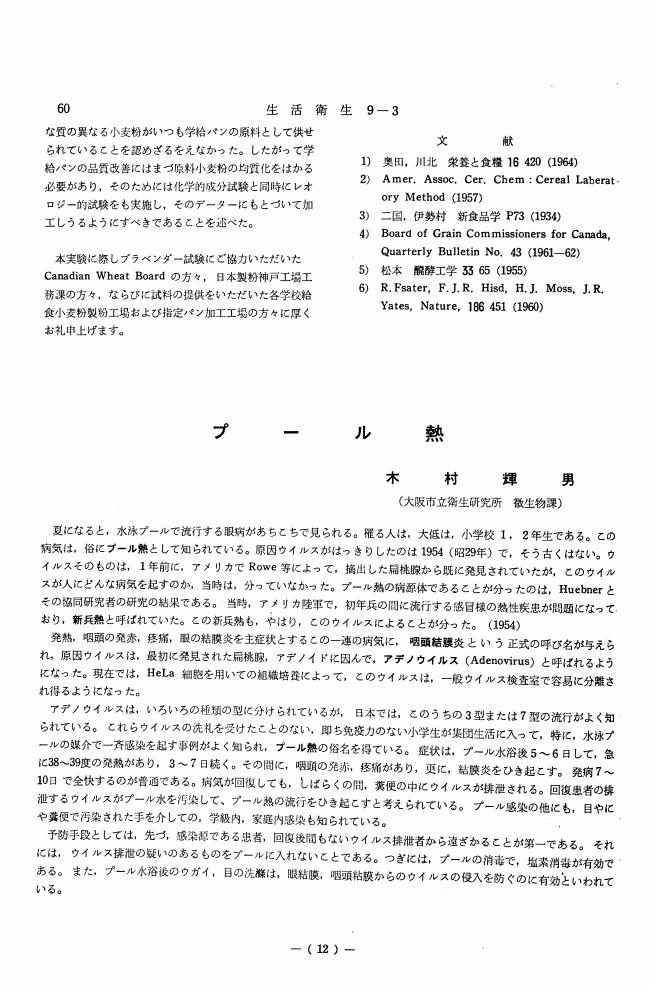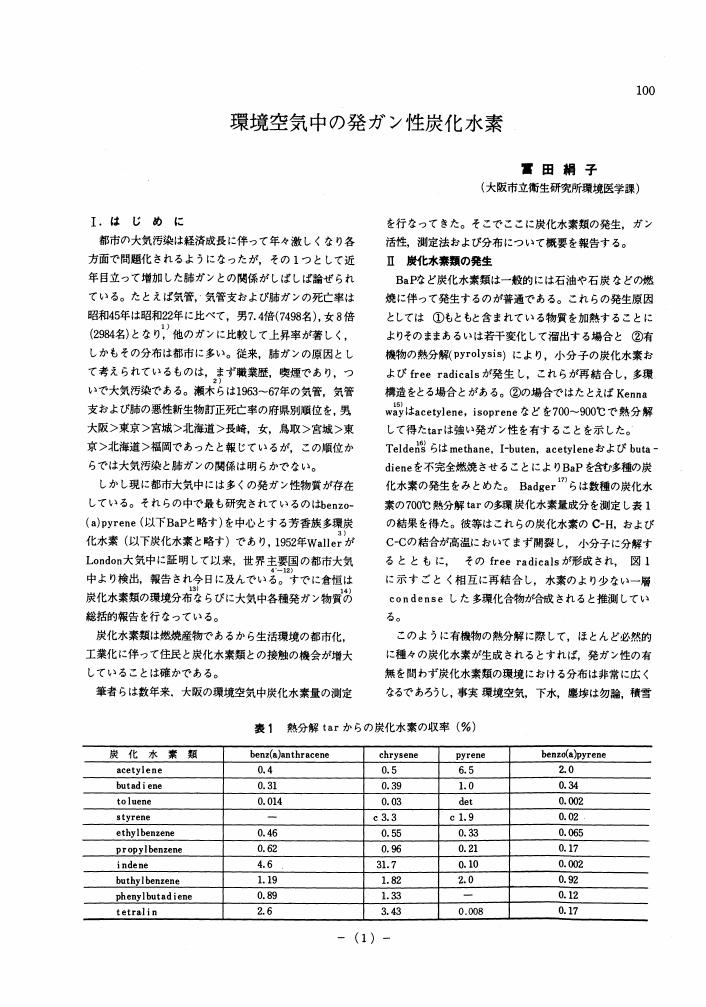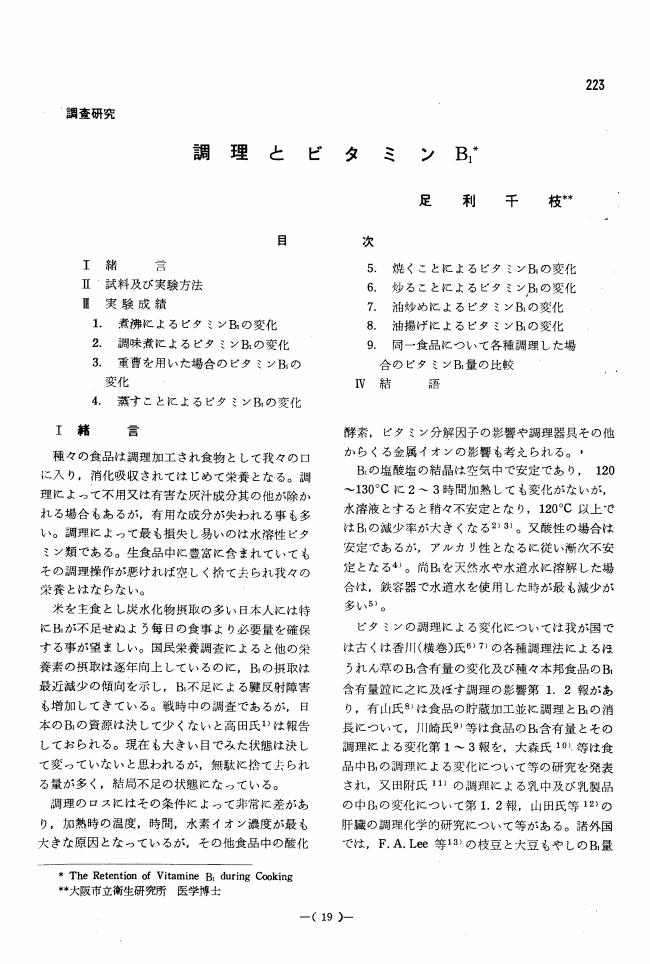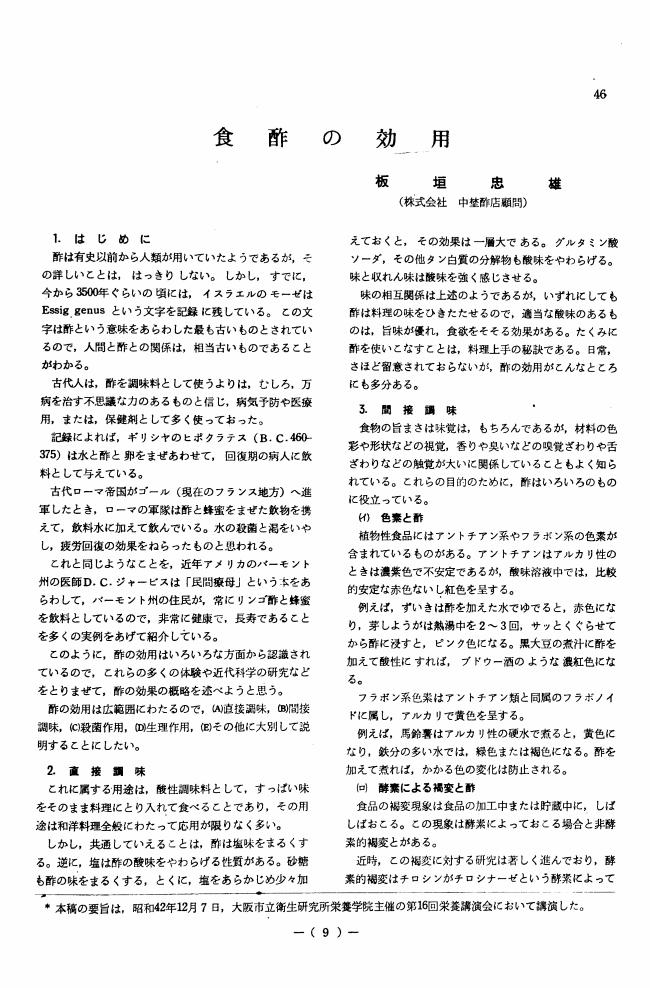1 0 0 0 OA 環境論ならびに環境生物学論
- 著者
- 今井 長兵衛
- 出版者
- Osaka Urban Living and Health Association
- 雑誌
- 生活衛生 (ISSN:05824176)
- 巻号頁・発行日
- vol.50, no.1, pp.12-26, 2006 (Released:2006-02-08)
- 参考文献数
- 122
- 被引用文献数
- 1
Textbooks and papers from both the social and the natural sciences were reviewed in the context of the concept of the environment and the subject matter of environmental biology. Basing on the results, the author concluded that the environment is a subject-dependent entity that is realized only when we take into consideration a living organism as subject, including humans. The human environment consists of many environmental factors, each of which is distributed, at a distance from a human or human group as subject, in an epistemological, non-physical space. A human subject can shorten the epistemological distance from its environmental factors by intensifying recognition of the environment. We can thus recognize the global environment in spite of its physical distance from our bodies. Environmental biology is an environmental science which deals with complex interactions in humans as subject, other living organisms as “second subject” and their environments. The major issues of environmental biology are the human impact on living organisms and vice versa, the impact of living organisms on environments and vice versa, the conservation or reconstruction of biological diversity, and, as a final goal, the establishment of sustainable coexistence between humans and other living organisms.
1 0 0 0 OA 21世紀に保健所が目指すもの 満一年を迎えた大阪市保健所
- 著者
- 中澤 秀夫
- 出版者
- 社団法人 大阪生活衛生協会
- 雑誌
- 生活衛生 (ISSN:05824176)
- 巻号頁・発行日
- vol.45, no.2, pp.49-50, 2001-03-30 (Released:2010-03-11)
1 0 0 0 OA 大阪市における公衆浴場ばい煙関係実態調査報告
- 著者
- 大阪市環境衛生監視員会公害部会
- 出版者
- 社団法人 大阪生活衛生協会
- 雑誌
- 生活衛生 (ISSN:05824176)
- 巻号頁・発行日
- vol.7, no.2, pp.78-81, 1963-04-30 (Released:2010-10-28)
1 0 0 0 OA 海面埋立処分地の水質制御と管理に関する大阪市立環境科学研究所の業績概略
- 著者
- 芳倉 太郎 西尾 孝之 藤原 康博
- 出版者
- Osaka Urban Living and Health Association
- 雑誌
- 生活衛生 (ISSN:05824176)
- 巻号頁・発行日
- vol.52, no.1, pp.33-43, 2008 (Released:2008-02-07)
- 参考文献数
- 73
- 被引用文献数
- 2
The present document summarizes the achievements of Osaka City Institute of Public Health and Environmental Sciences in the study of leachate control and management at a sea-based solid waste disposal sites in Osaka City.The document covers investigative research such as analysis of changes in water quality, advanced water treatment for the removal of nitrogen and micropollutans, water treatment using activated charcoal made from wastewood, and microbiological study.
1 0 0 0 OA プール熱
- 著者
- 木村 輝男
- 出版者
- 社団法人 大阪生活衛生協会
- 雑誌
- 生活衛生 (ISSN:05824176)
- 巻号頁・発行日
- vol.9, no.3, pp.60, 1965 (Released:2010-10-28)
1 0 0 0 OA 計算機化学とダイオキシン類の物性
- 著者
- 酒井 護
- 出版者
- Osaka Urban Living and Health Association
- 雑誌
- 生活衛生 (ISSN:05824176)
- 巻号頁・発行日
- vol.50, no.6, pp.501-509, 2006 (Released:2006-12-07)
- 参考文献数
- 72
Physical properties and chemical reactivities of an unknown chemical compound can be predicted by the thermodynamic quantities of that compound. There are so many isomers and congeners among dioxin analogues that it is impossible to measure the thermodynamic properties of all such compounds. In this case, we can compute these quantities based on quantum chemistry. This report summarizes the thermodynamic properties of dioxins based on computational chemistry and toxicity based on the QSAR method. Equations predicting PXDD and PXDF free energy were also derived using a quantum and deductive chemical approach.
1 0 0 0 OA 食塩
- 著者
- 神戸 保
- 出版者
- 社団法人 大阪生活衛生協会
- 雑誌
- 生活衛生 (ISSN:05824176)
- 巻号頁・発行日
- vol.26, no.6, pp.349, 1982-11-10 (Released:2010-10-28)
1 0 0 0 OA 良貨は惡貨を驅逐する
- 著者
- 佐治 敬三
- 出版者
- 社団法人 大阪生活衛生協会
- 雑誌
- 生活衛生 (ISSN:05824176)
- 巻号頁・発行日
- vol.3, no.2, pp.51, 1959-04-10 (Released:2010-03-11)
1 0 0 0 OA 砂糖について
- 著者
- 片山 伸也
- 出版者
- 社団法人 大阪生活衛生協会
- 雑誌
- 生活衛生 (ISSN:05824176)
- 巻号頁・発行日
- vol.12, no.3, pp.98-107, 1968-06-25 (Released:2010-03-11)
1 0 0 0 OA 環境空気中の発ガン性炭化水素
- 著者
- 冨田 絹子
- 出版者
- 社団法人 大阪生活衛生協会
- 雑誌
- 生活衛生 (ISSN:05824176)
- 巻号頁・発行日
- vol.17, no.4, pp.100-112, 1973-08-20 (Released:2010-03-11)
- 参考文献数
- 50
1 0 0 0 OA 蛔虫の駆除と栄養
- 著者
- 岡原 國男
- 出版者
- 社団法人 大阪生活衛生協会
- 雑誌
- 生活衛生 (ISSN:05824176)
- 巻号頁・発行日
- vol.3, no.2, pp.79-82, 1959-04-10 (Released:2010-03-11)
- 参考文献数
- 9
1 0 0 0 OA 寄生虫症における遺伝子検査の意義
- 著者
- 阿部 仁一郎
- 出版者
- Osaka Urban Living and Health Association
- 雑誌
- 生活衛生 (ISSN:05824176)
- 巻号頁・発行日
- vol.50, no.5, pp.387-394, 2006 (Released:2006-10-19)
- 参考文献数
- 43
Pathogenic analysis of clinical samples to detect the causative agent is the most reliable method of confirming infection. Morphological examination using light microscopy is a convenient tool, but the information thus obtained is limited. In Japan, while morphological examination is still the gold standard in many parasitic infections, recent molecular studies have produced a wealth of new findings helpful in the diagnosis, treatment and prophylaxis of parasitic infections. Currently, genetic examination is applied in the diagnosis of various infectious diseases to obtain rapid and accurate results and also to understand their molecular epidemiology. It is expected that molecular methodologies will be necessary for the diagnosis of various parasitic infections. In the present paper, the author summarizes the significance and prospects of genetic examination in parasitic infections.
1 0 0 0 OA PCR法によるアニサキス亜科幼線虫の同定
- 著者
- 阿部 仁一郎 八木 欣平
- 出版者
- Osaka Urban Living and Health Association
- 雑誌
- 生活衛生 (ISSN:05824176)
- 巻号頁・発行日
- vol.49, no.3, pp.168-171, 2005 (Released:2005-06-07)
- 参考文献数
- 10
- 被引用文献数
- 2
Anisakids are parasitic nematodes infecting fish and mammals. It is well recognized that human infection with this parasite, called anisakiasis, occurs by ingestion of raw or undercooked fish. In Japan, there are estimated to be over 1,000 cases of this infection annually. In 1999, “The Food Sanitation Law Enforcement Regulation” was partly amended, and anisakiasis was newly added to the causative agents of food poisoning. Identification of anisakid larvae has been performed by light microscopy, but it is impossible to accurately identify the worms morphologically when only small portions of the worm are available. In the present study, we showed the usefulness of PCR-based methods for identification of anisakid species using several species of anisakid larvae from Pacific cod. The larvae identified morphologically as Anisakis simplex or Contracaecum osculatum were found also to be positive for PCR amplification with only species-specific primers. In addition, the larvae of Pseudoterranova decipiens, frequently found in anisakiasis in Japan, were positive for amplification with only the P. decipiens-specific primers designed for the study. PCR using species-specific primers is thus concluded to be a useful tool for identification of anisakid larvae when morphological identification is impossible.
1 0 0 0 OA 乳卵菜食主義者の栄養・健康状態
- 著者
- 垣本 充 渡部 由美
- 出版者
- Osaka Urban Living and Health Association
- 雑誌
- 生活衛生 (ISSN:05824176)
- 巻号頁・発行日
- vol.34, no.5, pp.212-219, 1990-09-10 (Released:2010-10-28)
- 参考文献数
- 13
14~16歳の乳卵菜食主義者120名 (男子60名、女子60名) と、同年齢・同数の一般食の者を対象に、週日連続3日間の食物摂取調査およびCMI健康調査を行った。結果は下記のように要約される。1) 菜食群はナイアシンを除いて、各栄養素の摂取量平均値は所要量を充足していたが、一般群はエネルギー、カルシウム、鉄が不足していた。2) 体格的には、身長、体重、肥満、るい痩ともに、両群間に特異な傾向は認められなかった。3) CMI健康調査では消化器系項目で、菜食群男子は一般群男子に比べて自覚症状が有意に少なかった。
1 0 0 0 OA メロン類の成分について
- 著者
- 福田 正則 大柴 恵一
- 出版者
- Osaka Urban Living and Health Association
- 雑誌
- 生活衛生 (ISSN:05824176)
- 巻号頁・発行日
- vol.28, no.6, pp.345-347, 1984-11-10 (Released:2010-03-11)
- 参考文献数
- 4
新品種のメロンの成分について分析して次の結果を得た。水分, たん白質は成分表値に比較してやや高く, 逆に炭水化物は低かった。脂質, 灰分は成分表値とほぼ同じ値であった。無機質ではカルシウムとリンが成分表値より低く, ナトリウムと鉄が逆に高かった。カリウムはナトリウムの10倍近い値を示した。ビタミンCは成分表値より低かったが, 果実類の中では柑橘類に次ぐ高い値であった。メロンの保存状態と品質保持との関係を調べたところ, 無包装で室温に置くと10%もの減少を示し旗が, ラップで包み, 冷蔵庫に置くと変化は1%以下であった。すなわち保存する際にはそれらの条件を守る必要がある。
1 0 0 0 OA 水環境分野における大阪市立環境科学研究所の戦後の業績概略
- 著者
- 芳倉 太郎 北野 雅昭
- 出版者
- Osaka Urban Living and Health Association
- 雑誌
- 生活衛生 (ISSN:05824176)
- 巻号頁・発行日
- vol.52, no.2, pp.119-129, 2008 (Released:2008-04-07)
- 参考文献数
- 31
The present document summarizes the achievements of Osaka City Institute of Public Health and Environmental Sciences in the field of water quality examination and water research from ca. 1970 to ca. 1985.The document covers investigative and advanced research related to pollution control of river water and biological and chemical monitoring of the water environment in Osaka City.
1 0 0 0 OA 調理とビタミンB1
- 著者
- 足利 千枝
- 出版者
- Osaka Urban Living and Health Association
- 雑誌
- 生活衛生 (ISSN:05824176)
- 巻号頁・発行日
- vol.3, no.5, pp.223-236, 1959 (Released:2010-10-28)
- 参考文献数
- 31
1 0 0 0 OA 食酢の効用
- 著者
- 板垣 忠雄
- 出版者
- 社団法人 大阪生活衛生協会
- 雑誌
- 生活衛生 (ISSN:05824176)
- 巻号頁・発行日
- vol.12, no.2, pp.46-51, 1968 (Released:2010-10-28)
1 0 0 0 OA ニンニク無臭化抽出物のラット骨格筋モデルにおける抗疲労効果
- 著者
- 吉田 英生 羽田 尚彦
- 出版者
- Osaka Urban Living and Health Association
- 雑誌
- 生活衛生 (ISSN:05824176)
- 巻号頁・発行日
- vol.51, no.4, pp.249-252, 2007 (Released:2007-08-07)
- 参考文献数
- 12
The anti-fatigue properties of odorless garlic extract (OGE) were investigated by monitoring the recovery rate from muscular fatigue in anesthetized rats. In the experiment, muscular fatigue was induced by applying rapid electric stimulations to the skeletal muscle. Fatigue recovery rates were measured after a 60- and a 90-minute interval in the treated group and the control group, respectively.The results indicated that OGE had a certain degree of anti-fatigue effect (p<0.1) in the treated group (1g/kg/day oral administration of OGE for 14days). No significant body weight change in either group was observed during the experiment period, suggesting that OGE is safe at the dosage given (1g/kg/day).
1 0 0 0 OA サツマイモ
- 著者
- 神戸 保
- 出版者
- 社団法人 大阪生活衛生協会
- 雑誌
- 生活衛生 (ISSN:05824176)
- 巻号頁・発行日
- vol.29, no.5, pp.290, 1985-09-10 (Released:2010-03-11)
